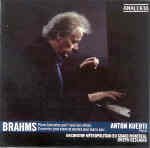Anton Kuerti approaches Brahms’ piano concertos in the taut, fire-and-brimstone manner espoused by his one-time teacher, Rudolf Serkin, as opposed to the magisterial breadth characterizing Arrau/Haitink, Rubinstein’s valedictory versions, and Gilels’ collaborations with Jochum. For instance, there’s little lingering or sensual detailing in the slow movements. At the same time, Kuerti takes every opportunity to personalize unaccompanied sequences and thematic repetitions with unusual accentuation or phrasings that underscore the composer’s love for cross-rhythms (for example, his first-movement entrance in the D minor concerto and the chains of trills in the B-flat concerto’s slow movement). I also like how Kuerti and conductor Joseph Rescigno impart a refreshing two-to-the-bar impetus to both finales that easily absorbs probing, purposeful rubatos. While the Orchestre Métropolitain du Grand Montréal hardly matches the standard-setting precision and tonal variety heard in the Szell/Cleveland and Harnoncourt/Concertgebouw recordings (the Montréalers clearly are more comfortable in the B-flat than the D minor), you still infer a strong podium presence. I should also mention that there is nothing in these concertos that Kuerti’s technique cannot handle with the utmost ease.
Arthur Rubinstein’s description of Brahms’ later solo pieces as “chamber music for piano solo” definitely applies to Kuerti’s keen sense of what lines to bring out and follow through in the three Op. 117 Intermezzi (No. 3 is faster and more angular than usual) and in the Op. 76 group. In the latter, I only question the pianist’s dry, exaggerated way with No. 3’s accompaniment, as if to caricature Glenn Gould’s caricature. The two Op. 79 Rhapsodies are a shade picky in articulation and rhythmically fussed over.
Kuerti probes Op. 119 No. 1’s stark desolation, stretching the descending thirds to tears, and points up No. 2’s subtle rhythmic variations (the central waltz, with its nostalgic hints of the composer’s earlier Op. 39 No. 2, is gorgeously nuanced and proportioned). The “Myra Hess” No. 3 is dry and affected when it should be graceful and lilting, but Kuerti’s solid, shapely block chords in the set’s final piece are right on the money. Lengthy analytical notes from the pianist fill out the CD booklet. In all, a stimulating release that’s guaranteed to shake jaded Brahmsians out of their listening comfort zones.
































